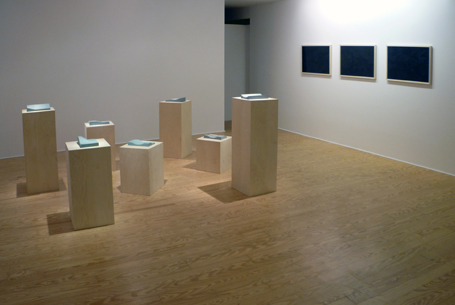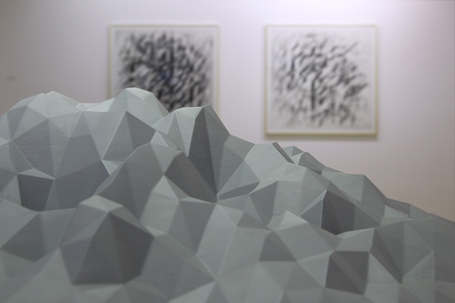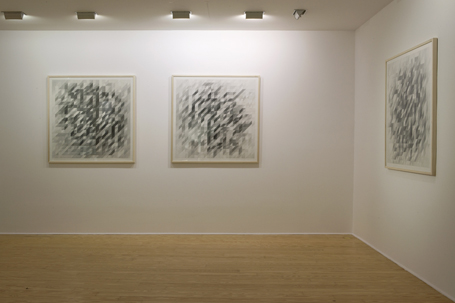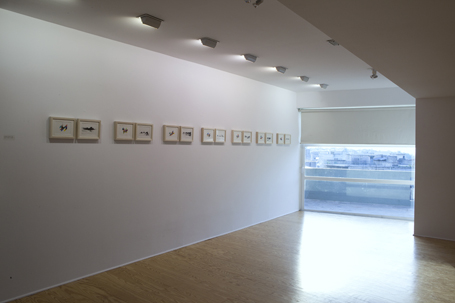Nikos Arvanitis
Stones, Politics
Solo exhibition, a.antonopoulou.art gallery, Athens, Greece,
10.01 - 12.02.2011
10.01 - 12.02.2011

The recent work of Nikos Arvanitis, comprises multi-edged
natural landscapes, three-dimensional rocky mountains, flat
volumes, and small ?stone? sculptures. Through his work, Arvanitis
suggests a contemporary visual allegory for the character of
politics as formed in the societies of our era. It is an era
marked by the decline of the 20th century political narratives,
the disillusionment of grand social visions, and the dismantle of
the related ideological and imaginary structures.
For certain, it is a transitional era. No longer is politics, both as form and content, characterized by social participation; nor does it express rival social goals and ideas. In its place, there stands what, one may call, non-politics.
Arvanitis?s allegory departs from within the natural world, namely from one of its most trivial materials: the stone. The stone is present with its natural and psychological attributes, its geographical formations, and its infinite figural manifestations. This long-lasting element, possibly the most archaic and abundant on our planet (along with water), becomes a conceptually useful symbol/ tool. For the stone can signify (or even serve as a name for) nearly all the notable facets of a historical era.
Rather frequently, art, as a narrative form of space and time, may be seen as almost identical with the history of civilization and of societies; it may be seen as a long voyage from the local to the ecumenical, from longing to disappointment, from the ground of reality to the realm of the imaginary and, often, to absolute absurdity. Art is a relentless migration from the loci of realism to the isles of utopia and from there to the spheres of the non-place.
In his approach, Arvanitis utilizes various aesthetic practices, techniques, and media so as to materialize the gray zones wherein the virtual and the real,the rational and the irrational, the partial and the whole co-exist. In this manner, he interprets the post-political situation he is concerned with. His method is of all-embracing as well as meticulous observation. He intends to transform a visual approach to a viewpoint of social criticism. Arvanitis's take on the negative prefix ?non? of the non-place does not amount to a denial but rather to an affirmation driving to "the production of the new".
>> "Stones, Politics, A Science-fiction Approach" by Theoni Fotopoulou on Nikos Arvanitis: Stones, Politics solo show (.pdf)
For certain, it is a transitional era. No longer is politics, both as form and content, characterized by social participation; nor does it express rival social goals and ideas. In its place, there stands what, one may call, non-politics.
Arvanitis?s allegory departs from within the natural world, namely from one of its most trivial materials: the stone. The stone is present with its natural and psychological attributes, its geographical formations, and its infinite figural manifestations. This long-lasting element, possibly the most archaic and abundant on our planet (along with water), becomes a conceptually useful symbol/ tool. For the stone can signify (or even serve as a name for) nearly all the notable facets of a historical era.
Rather frequently, art, as a narrative form of space and time, may be seen as almost identical with the history of civilization and of societies; it may be seen as a long voyage from the local to the ecumenical, from longing to disappointment, from the ground of reality to the realm of the imaginary and, often, to absolute absurdity. Art is a relentless migration from the loci of realism to the isles of utopia and from there to the spheres of the non-place.
In his approach, Arvanitis utilizes various aesthetic practices, techniques, and media so as to materialize the gray zones wherein the virtual and the real,the rational and the irrational, the partial and the whole co-exist. In this manner, he interprets the post-political situation he is concerned with. His method is of all-embracing as well as meticulous observation. He intends to transform a visual approach to a viewpoint of social criticism. Arvanitis's take on the negative prefix ?non? of the non-place does not amount to a denial but rather to an affirmation driving to "the production of the new".
>> "Stones, Politics, A Science-fiction Approach" by Theoni Fotopoulou on Nikos Arvanitis: Stones, Politics solo show (.pdf)

Exhibition view.

Exhibition view.








